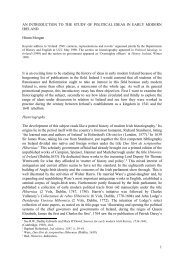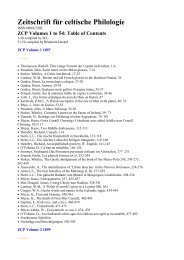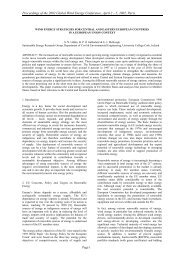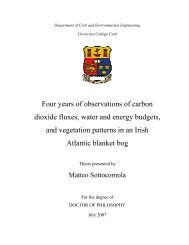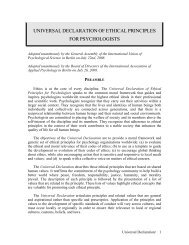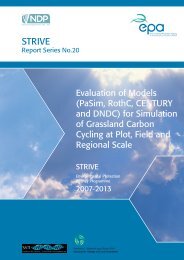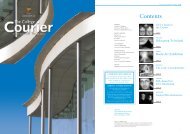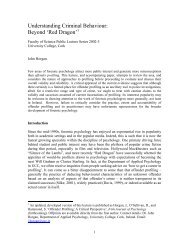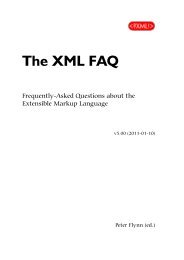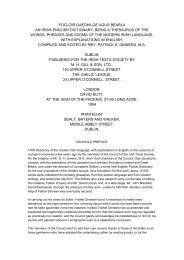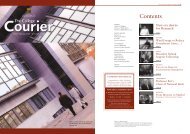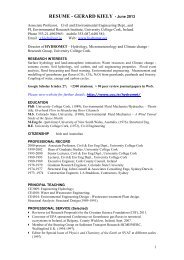Kelten, Römer, Griechen III CFP
Kelten, Römer, Griechen III CFP
Kelten, Römer, Griechen III CFP
Sie wollen auch ein ePaper? Erhöhen Sie die Reichweite Ihrer Titel.
YUMPU macht aus Druck-PDFs automatisch weboptimierte ePaper, die Google liebt.
ler zusammenführen. Über die fällige große Bestandsaufnahme zum Thema „<strong>Kelten</strong> im<br />
Römischen Reich“ hinaus erhoffen wir uns von den Diskussionen zwischen Forschern, die<br />
sonst die jeweils andere Seite zumeist aus relativ enger Perspektive und großer Ferne in<br />
den Blick nehmen, eine Horizonterweiterung im Sinne einer Annäherung keltologischer<br />
und klassisch-altertumswissenschaftlicher Studien überhaupt.<br />
Vorschläge für Vorträge können bis zum 15. Februar 2014 an celtoromania@skph.uni-heidelberg.de<br />
geschickt werden und sollten einen Titel sowie ein Abstract im Umfang von<br />
150-300 Wörtern enthalten. Die Vorträge sollten 30 Minuten lang sein. Nähere<br />
Informationen werden ab dem 1. April 2014 versandt.<br />
English version<br />
**********<br />
Celtic perhaps reached its widest extent in (Central) Europe around the time of Christ's<br />
birth. In Antiquity Celts had settled far and wide, not only in western Europe from Britain<br />
and Ireland to Spain, but also in south-central and south-eastern Europe and into Anatolia.<br />
The expansion of the Roman Empire had brought practically the entire area of Celtic language<br />
and culture under its sway. Celtic lost its leading position to Latin. This process of<br />
displacement has lasted right down to the present, whereby the area of Celtic speech is now<br />
confined to north-western Europe, as a result of which Celtic has lost ground to a Latin<br />
daughter-language and a Germanic language heavily influenced by the same.<br />
The proposed Symposium aims to look further into the multiple language and cultural<br />
contacts resulting from initial Celtic expansion to its later displacement. The main emphasis<br />
will concentrate on the contacts between the Celtic languages and their Latin /Romance<br />
and Greek counterparts, which are to be seen rather as mutual influences than as one-sided<br />
dominance. In addition, contact with other relevant languages of the period (e.g. Celtic-<br />
Germanic language contact, Italo-Celtic contacts, possible hamito-semitic influence on the<br />
toponomy in the area of Britain and Ireland, etc.) would also be brought in.<br />
Possible ideas for papers may include:<br />
- Celtic loanwords in Latin from the time of the Roman Republic onwards.<br />
- Celtic influence on Roman politicians /Latin authors, whose families originally derive<br />
from Celtic areas (e.g. Cisalpine and Transalpine Gaul, Spain. etc.) and who exercised considerable<br />
influence in Rome. Perhaps there are traces of Celtic influence to be seen in their<br />
works?<br />
- Traces of Celtic elements in personal and place-names deriving from Antiquity.<br />
- Substrate influences from the Celtic languages in (Vulgar) Latin and various phenomena<br />
still to be seen in some modern Romance languages.<br />
- Influences from Latin in the syntax particularly of the Insular Celtic languages, which -<br />
differently from Continental Celtic - survived Antiquity and which may still be spoken to<br />
2



